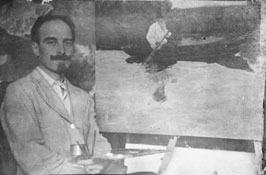Family records indicate that business had tapered off by the mid-1930s. How much this was due to the worldwide Depression or to the artist’s age is unclear. It may have been a combination of both. From the moment of his exile in America, Djeneeff had been forced to protect his economic interests. Not all clients had treated him fairly, and his correspondence is filled with instances of late payments and small indignities. Still, he persevered and consistently supported his family by creatively applying his skills and Russian training to the American marketplace. In December 1954, having learned of Djeneeff’s ill health, Marian MacDowell wrote a supportive letter to Olga in which she also commented on nearly fifty years of Colony successes. Djeneeff would die six months later in June 1955.
In assessing Ivan Djeneeff’s artistic career in America, it is clear that he had a profound and unwavering attachment to his homeland and felt a deep sense of loss - of family, social status, and standing among a community of artists whose work and style he respected. He viewed Old Russian themes, stories, saints, and academic landscapes as symbols of a happier past, and continued to paint and draw them - even recreating canvases lost to him during the Revolution - for the remainder of his life.
 Artist with original Old Boatman painting (ca. 1910) |
 Ivan Djeneeff, Old Boatman, 1930s |